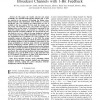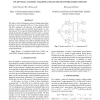103 search results - page 15 / 21 » Multiuser capacity in block fading with no channel state inf... |
CORR
2010
Springer
13 years 7 months ago
2010
Springer
In this paper, the ergodic sum-rate and outage probability of a downlink single-antenna channel with K users are analyzed in the presence of Rayleigh flat fading, where limited cha...
GLOBECOM
2007
IEEE
14 years 1 months ago
2007
IEEE
Abstract— Duality between the multi-antenna multi-user uplink and the downlink has been discovered in terms of sum rate, capacity region, signal-to-interference-plus-noise-ratio ...
ICASSP
2011
IEEE
12 years 11 months ago
2011
IEEE
We study a multi-cell frequency-selective fading uplink channel from K user terminals (UTs) to B base stations (BSs). The BSs, assumed to be oblivious of the applied encoding sche...
ICC
2009
IEEE
14 years 2 months ago
2009
IEEE
— Both fast scheduling and spatial signal processing have proven to be capacity-increasing methods in wireless communication systems. However, when applied in the downlink of a c...
CORR
2008
Springer
13 years 7 months ago
2008
Springer
Distributed space-time block coding is a diversity technique to mitigate the effects of fading in multi-hop wireless networks, where multiple relay stages are used by a source to ...


